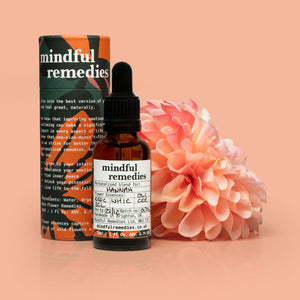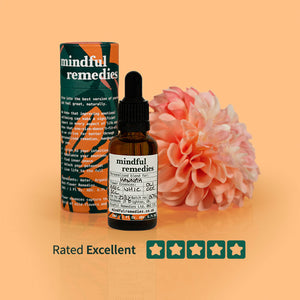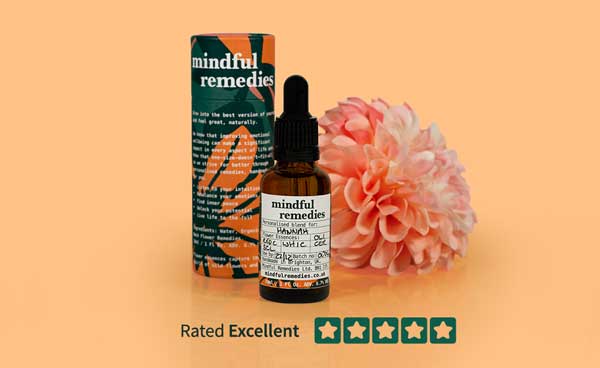your basket
- choosing a selection results in a full page refresh

Do you ever feel like you can't switch off your mind? Like you're constantly worrying about things that don't matter and stressing out over things you can't control? If this sounds like you, then read on. In this blog post, we will discuss how to switch off your mind and relax. We will provide some tips and tricks that will help you to achieve a state of mindfulness and peace. Finally, we will review some flower remedies that can also help with stress or an overactive mind if you're looking for natural remedies for anxiety or stress. So, if you're feeling stressed out, anxious, or overwhelmed, read on for some helpful advice!
First and foremost, it's important to understand that everyone experiences stress and anxiety at different levels. For some people, the worry and stress is manageable and doesn't affect their day-to-day lives too much. However, for others, the worry and stress can be debilitating and can prevent them from living a happy and healthy life. If you find yourself in the latter category, don't worry, there are things that you can do to help switch off your mind. If you find that your worry and stress is impacting your life in a negative way, it's important to seek help from a professional. There are many resources available to help you manage your anxiety and stress.

Relaxation is often thought of as a luxury, something we allow ourselves to indulge in only when we have free time. However, the truth is that relaxation is essential to our well-being. It helps to reduce stress, improve our moods, and boost our immune systems. When we relax, our bodies are able to heal and repair themselves, and we can better deal with the challenges of daily life. There are many different ways to relax, from simple activities like taking a walk or reading a book to more elaborate ones like getting a massage or going on holiday. No matter what form it takes, relaxation is an important part of a healthy lifestyle.
Stress is a response to a demand placed on our bodies. When we perceive a threat, our bodies release hormones that prepare us to fight or take flight. This “fight-or-flight” response is a survival mechanism that served our ancestors well when they were faced with predators or enemies. However, we are often bombarded with demands (work deadlines, family obligations, financial worries, etc.) that can trigger this stress response even though we are not in physical danger. Over time, this chronic stress can take a toll on our physical health. It can weaken our immune system, making us more susceptible to illness. It can also cause high blood pressure, headaches, and digestive problems. The next time you're feeling overwhelmed, remember that stress is more than just a mental health issue - it can have a major impact on your physical wellbeing as well.
Relaxation is a deliberate mental state that can help to reduce feelings of stress and anxiety. When we relax, our heart rate slows, our muscles loosen, and our breathing becomes more regular. This increase in physical relaxation also alters our state of mind, helping us to feel calmer and more focused. In addition, relaxation techniques such as mindfulness and meditation can help to improve our mood and well-being. While it is not always possible to completely eliminate stress from our lives, relaxation can be an effective way to manage it. By taking some time out to relax on a regular basis, we can help to keep our stress levels under control.
One of the most difficult things to do in our constantly-connected world is to switch off our minds. Whether we're trying to fall asleep after a long day or simply want to take a break from the constant stream of thoughts, it can be hard to find a moment of peace. However, there are some helpful tips that can make it easier to achieve mindfulness and silence the mind. One of the simplest things you can do is focus on your breath. As you inhale and exhale, pay attention to the sensations of the air moving in and out of your body. You can also focus on a mantra or affirmation, repeating it over and over again until your mind is completely still. With a little practice, it's possible.
Mindfulness is a form of meditation where you focus on being present in the moment. Being mindful can help to ease anxiety and stress, and it can also be a helpful tool for managing chronic pain. If you're interested in trying mindfulness, there are a few things you can do to get started. First, find a comfortable place to sit or lie down. Then, focus your attention on your breath. Notice the sensation of the air moving in and out of your lungs. As thoughts arise, simply acknowledge them and then let them go. Don't try to push them away or judge them. Just let them be. Mindfulness takes practice, but with time, it can be a helpful way to switch off your mind and relax your body. There are many helpful apps or podcasts that can help with guided meditation.

There are many different relaxation techniques that can be used to reduce stress and promote calm. Some of these techniques can be done at home with minimal equipment. One simple technique is progressive muscle relaxation, which involves tensing and relaxing different muscle groups in the body. Another is deep breathing, which helps to slow the heart rate and improve oxygen levels in the blood. Guided imagery is another effective relaxation technique that involves picturing peaceful images in the mind. These are just a few of the many relaxation techniques that can be done at home to promote feelings of calm and wellbeing.
Relaxation is an essential part of a healthy lifestyle, yet it can be difficult to make time for it in our busy schedules. However, there are many small ways to incorporate relaxation into your daily routine. For example, instead of watching TV or scrolling through social media after dinner, try spending a few minutes reading or listening to calming music. During your lunch break, step outside for a few minutes of fresh air and sunshine. And before going to bed, take a few deep breaths and let go of any stress from the day. By making relaxation a part of your daily routine, you’ll soon find that you feel more relaxed and refreshed overall.
Bach flower remedies are a popular natural treatment for stress and anxiety. These natural remedies help to restore balance and harmony to the body, mind, and spirit. There are 38 different Bach flower remedies, each of which addresses a specific emotional issue. Dr Bach discovered these remedies in the 1930s and they have been used worldwide ever since. They are completely natural, safe and gentle. Below are our recommendations for Bach flower remedies for stress and anxiety:
White Chestnut: to help switch off your mind and relax if you're suffering from an overactive mind which won't stop ruminating.
Vervain: for reducing tension if you're overeager and take on too much
Impatiens: for patience if you're suffering from stress and irritation due to wanting everything done quickly
Elm: for bringing back confidence if you're feeling overwhelmed and unable to cope with pressures
Rock Water: for a flexible mind if you're overly perfectionist and can't let any imperfections go
Cherry Plum: for helping to bring composure when you feel like you're at breaking point
Mimulus: to help you overcome your fears if you're struggling with anxieties because of something specific
The above are the main Bach flower remedies you might want to consider to help with switching off your mind and relaxing, however we have created specific pages for stress and anxiety with all the remedies you might want to consider.

Stress and anxiety are a normal part of life, but sometimes they can become overwhelming. If you find yourself struggling to cope, it is important to seek help. There are many resources available, including support groups, therapy, and medication. Talking to someone who understands can be incredibly helpful. They can offer suggestions for dealing with stress and anxiety, and they can provide support and encouragement. In addition, there are many self-help books and online resources that can be useful. The most important thing is to reach out for help if you are feeling overwhelmed. There is no shame in admitting that you need assistance, and seeking help is an essential step in managing stress and anxiety.
There are many ways to relax and switch off your mind, ranging from simple at-home techniques to natural remedies. Relaxation is an essential part of a healthy lifestyle, yet it can be difficult to make time for it in our busy schedules. However, by making relaxation a part of your daily routine, you’ll soon find that you feel more relaxed and refreshed overall. If you’re struggling to cope with stress and anxiety, seek out help from a support group, therapist, or self-help resources. Remember, you are not alone in this – reaching out for help is an essential step in managing stress and anxiety.
If you're interested in creating your own personal flower remedy, we offer the ability to create a personal blend with up to seven remedies in each bottle.

Since 2021, Lucy Edwards, a qualified Bach Flower Practitioner and the driving force behind Mindful Remedies, has connected with clients across the world. Crafting thousands of personalised remedies, Lucy has supported individuals' emotional wellbeing, shipping remedies to far-flung places like the USA, Thailand, and Australia.
Lucy is readily available for conversations, offering personalised advice to guide you on the path to holistic wellness. It's important to note that she's not only qualified but also registered with the Bach Centre, ensuring that every consultation and remedy adheres to Dr Bach’s original guidelines for expert care and efficacy.
Exclusive pricing 20% off your first subscription order and 5% off all future orders
VIP treatment Receive personalised advice from Lucy, free gifts & 15% off gift vouchers
Easy to manage Edit remedy, change schedule, pause or cancel at any time
Exclusive online workshops Access to workshops focusing on emotional wellbeing, guided by Lucy
Early access to new products Be the first to try out new remedies or wellness products, before anyone else



